Photographs: Amit Dave/Reuters Sheela Bhatt in New Delhi
In part 1 of this interview conducted in February Professor Shiv Visvanathan spoke to Rediff.com's Sheela Bhatt on the recent demonstrations by India's youth, and on current political and social trends.
Read Part 1: 'Youth were not protesting against rape, but indifference'
In part 2, the intellectual and author talked of the dangers of celebrating the reign of Narendra Modi and why the Gujarat chief minister may be a bad bet as prime minister.Read Part 2: 'In the long run Modi can be dangerous for India'
In the final part, he talks some more about Modi's chances of becoming PM, the professor's stay in Gujarat and how he was finally ousted from there.While discussing Modi, a minister in United Progressive Alliance government once said, while highlighting caste factor, that when Modi stands up to speak in Mathura in UP or Chhapra in Bihar, the crowd will ask, 'Iski jaat kya hai?' (what's his caste?)
So, if the question is, "Can he win in Bihar?" No, he cannot beat Nitish Kumar. There are caste constituencies over there. Modi is also building his own constituencies. At the national level, the media has made Modi into a national figure. I don't have to approve the process, but reality demands that I acknowledge it.
But predictably Modi's strategies, so far, came true because the Congress was hesitant, because the United Progressive Alliance's reforms were stupid, because Sonia Gandhi was ill, because the economy was doing badly. In this situation Modi looks like a technocratic angel.
Please ...
'Modi doesn't allow anything to grow under him'
Image: Once Modi comes, there's only him in BJP, notes VisvanathanPhotographs: Amit Dave/Reuters
Do you think the BJP's strategy to, probably, declare Modi as their PM candidate is a good strategy?
No. I think it is a bad strategy. He's bad for the BJP. He doesn't allow anything to grow under him. So far the BJP has been a collective initiative under Sushma Swaraj, L K Advani, Arun Jaitley and others. Once Modi comes, there's only him.
But everyone wants votes and electoral victory.
Is Modi good for the BJP's victory? Yes. Is he good for the BJP as a party? No. Because, any party should be a plural process.
If compared to Modi, Rahul Gandhi is not a self-made person. He doesn't have any experience of governance. But here is Modi more with the people, for the people.
Your first part is right. Rahul Gandhi is a fabrication of family, the Congress and the media. Only thing is that they fabricated him so early that he is like an egg that refused to hatch. Only Prince Charles (of England) had a longer gestation period.
Let's give Modi his due. Where else would you find a tea stall chap becoming the chief minister? Also, where else will you find RSS pracharak aspiring to becoming PM? Also, here is a man who built himself. His techniques are different. They are self made, very shrewdly constructed and he absorbs from the surroundings around him.
Whatever is the common parlance, whatever is in the fashion, Modi has it. Look at the way he changed his clothes. He absorbs from the environment. For all his swadeshi image, he is the moderniser. He is just that. In that sense he is obvious, brilliant and seductive, especially to the middle-class.
And that would be the tragedy of India, if we fall for that seduction. Because, Indians require a different kind of complexity. You can't reduce India's problems to a possible guarantee of stability. You need other things.
Please ...
'Jayalalithaa is more intolerant than Modi'
Image: I'm worried about the rise of regional authoritarians like Modi, Mulayam, Jayalalithaa and Mayawati, says VishvanathanPhotographs: Babu/Reuters
When I meet Modi's supporters and confidantes they convincingly argue to show us one leader who is not autocratic. They name J Jayalalithaa, Mayawati, Mulayam Singh Yadav, Sonia Gandhi and Mamta Bannerjee. Within their party who is not an autocrat? Your main problem with Modi is that he is authoritarian. Why aren't you harsh on other Indian leaders as well?
I am. I think let's put it this way. What we have in India is a threat to democracy from a series of regional authoritarianisms. Why does Modi catch on? He ...
'Modi a quick learner'
Image: A BJP supporter holds a poster featuring Narendra Modi during a jubilation ceremony outside the party office in Ahmedabad.Photographs: Amit Dave/Reuters
Before coming to you I wrote a column and my first line is that the definition of secularism in contemporary Indian politics will hover around 160/180 seats. Whichever party will get more than 160 seats, the leader of that party will be termed secular by all these regional leaders.
Secular is a coalitional definition. So let's face it, this is where my fear of politics is. Let's say that so far Indian democracy has domesticated everyone, short of Sanjay Gandhi. This situation is very open. I don't see a long-term future of India.
Explain why? If Modi becomes PM, then?
I think at one level he is not going to be able to change much. What is he going to change? The security scenario? Is he going to change what is happening in Afghanistan? Is he going to change the Naxalite situation? He might become more brutal and authoritarian. Second, once he becomes the PM, do you think all those regional chieftains are going to surrender power to him?
Academics like you keep mapping the short-term and long-term future. Can you imagine Modi at 7, Race Course Road and ruling over India?
Yes. Because if you look at his photographs, they have already drawn as if he is sitting in Lutyen's Delhi. If you look at the Time magazine photo of Modi, if you look at many of these things, they're long drawn landscape shots where he already seems to be enjoying power. The semantics of the Modi representation is actually almost futuristic. Remember he is the chieftain, the hero, the winner next.
What sort of foreign policy will Modi have?
I don't think he can change Indian foreign policy. One thing is that Modi's foreign policy, like the Republican Party's foreign policy, it will be more realistic because it will try to negotiate with China. Beyond that I cannot see any major dent.
He will encourage business and investment. He will try to make things clear for that. Then he will have to balance between his swadeshiness and his global strategies. There then he'll find that India is a much more complex entity. Eventually Modi can't do it alone. He needs a back up. Just like A B Vajpayee had his bureaucrats, Modi needs to pick his bureaucrats. I'm not sure of the team. They will do a lot of shaping.
But one thing is interesting to note. So far, Modi has done very good business with China.
Now I don't know if that will continue once he becomes PM. You see we have to have a long range policy against China. Pakistan is something that immediately haunts us. I think those articulations will take time and that would be articulated by Modi only. A lot of people, including foreign governments, bureaucrats, journalists, will try to influence Modi.
Out of that interaction will come the 'Modi policy'. I don't think it's clear, now. Everyone assumes everything is clear about Modi. My argument is the other way around. The only thing clear about Modi is his urge for power and that he is a quick learner.
Authoritarians can learn but it's only when they don't hear properly that they make mistakes. So between the quick learning authoritarianism and the fact that Modi doesn't have a hearing aid for dissent, we might soon find the future quite bloody and fearful.
We will see whether Modi will tell quite a few intellectuals that it's time they behave because they are either exportable or unnecessary. But what will happen is that because they are intellectuals and sycophantic, they'll all land up to side with Modi. So people like me will be fully employed in the dissenting margins again.
Please ...
'Modi won't let me look at the contradictions in Gujarat'
Image: I have nothing to complain against Gujarati society or Gujarat, says Professor Shiva Visvanathan.Is it true that he influenced your ouster from the institution in Gujarat? Can you tell us about it?
Yes, I can tell you what I heard. Some of my colleagues and I -- I have been working with Teesta Setalvad and Shrikumar -- we did the design for Gulberg society massacre's tenth anniversary. A colleague of mine and I did an investigation on the refugee camps and she shot the photographs and we set up the exhibition. It was stunning. Because over 3,000 people came, expressed solidarity, hundreds of foreigners came, journalists came, it was stunningly impressive.
Few days after this I was sitting in an interview for a candidate, when the director of Dhirubhai Ambani Institute in Gandhinagar said I should come out. He told me you've done it again. I asked, "What?" He said you're in trouble. He said Modi has objected to you. I said, "It's inevitable."
In fact it's very strange that he didn't object to me so far. He said, "It's more serious this time." Modi has reportedly approached Anil Ambani. And you have three options. Go abroad for four years and we'll forgive you. I said go abroad this time? No. Then he said apologise. I said no. Then they said if some violence happens to you in the campus and students are hurt, who'll be responsible?
I said I'll take that responsibility. He asked if I will take security. I said no. Then he says, I have only one alternative and that is to submit my resignation. I said fine, you'll have my resignation. The director, S C Sahashrabudhe, took one and a half months to accept it. And by that time I applied for a few jobs and I got one.
I realised by then that our dream of building a great social science department was over and that was that. No drama. One left because one knew that we are marginals.
How do you feel about Gujarati society?
I love the place. I enjoyed the company of my colleagues. I employed the laziest lifestyle, over there it's a bit slower. I enjoyed Gujarati food. I loved the people. Those ten years were great for me. I have nothing to complain against Gujarati society or Gujarat. But the sadness is that eventually one had to go.
The same society that you like is a supporter of Modi. How do you feel about that?
That is why I decided to stay in the society and had decided to make it my home and fight. And look at these very contradictions. But the sadness is that Modi won't let me look at the contradictions. He somehow feels social sciences are a bit unnecessary and maybe dangerous. But his execution was clean. I and another colleague of mine, we left and that's it.
Please ...
'Rahul Gandhi still looks junior'
Image: Rahul Gandhi will be more dignified, silent if he becomes the prime minister, argues Prof VisvanathanPhotographs: Adnan Abidi/Reuters
If the Congress party manages 2004 situation, once again, when they won 145 seats and managed to get a coalition in place, then how do you see Rahul Gandhi's elevation?
He'll be more dignified. More silent. He'll have to grow into the job. He still looks junior. He has to assemble a team, which is not clear. Many others of his team members look more confident than him. It is like watching a collection of boy scouts graduate into national leaders, but it would be an interesting phenomenon. Some good should come of it because being weaker, more tentative, they might listen in the beginning, but I don't know for how long?
Why do you feel that he is not authoritarian?
He hasn't been given a chance. There is a shade of authoritarianism in the Congress but the poor guy, he has always been second third or junior. Let him be PM only then we would know.
When I was coming to interview you I told a 20-year-old friend, studying at St Stephens, that I'm meeting you. I asked her to give me a question to pose before you. She said, ask, "Is anything going to change? Are these protests in the cities helping us?"
I shall give you an honest message. One, the very fact, that they protested, they have changed. From looking on indifferently, from being spectators, they became activists. From being passive citizens, they become agents of change.
And if 300 of them change, you have a theory of change. You have a movement that looked in a different way and reflected. 300 students protested and changed themselves -- it is an education. That is my hope.
You are advocating that these 20-year-olds should act and protest.
Yes. And make mistakes. Our society does not tolerate mistakes but in making mistakes they'll learn how to rebuild this society.

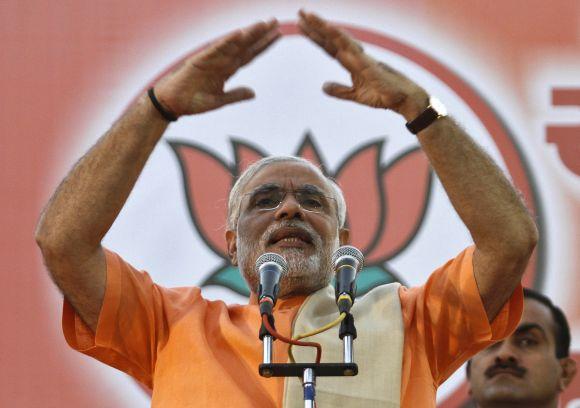
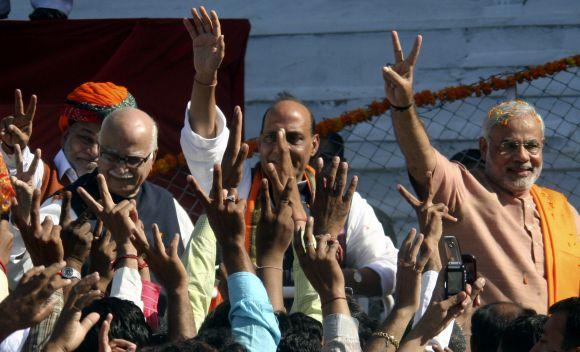
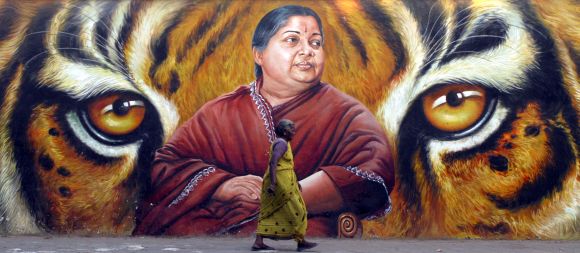

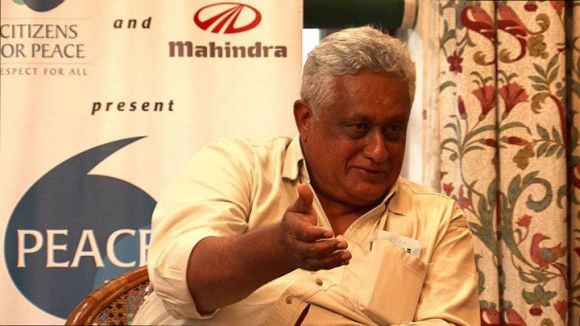
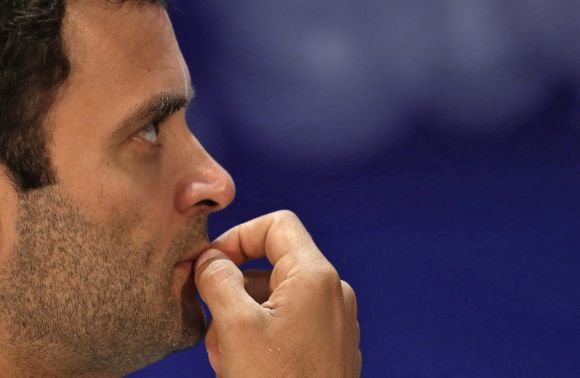
article